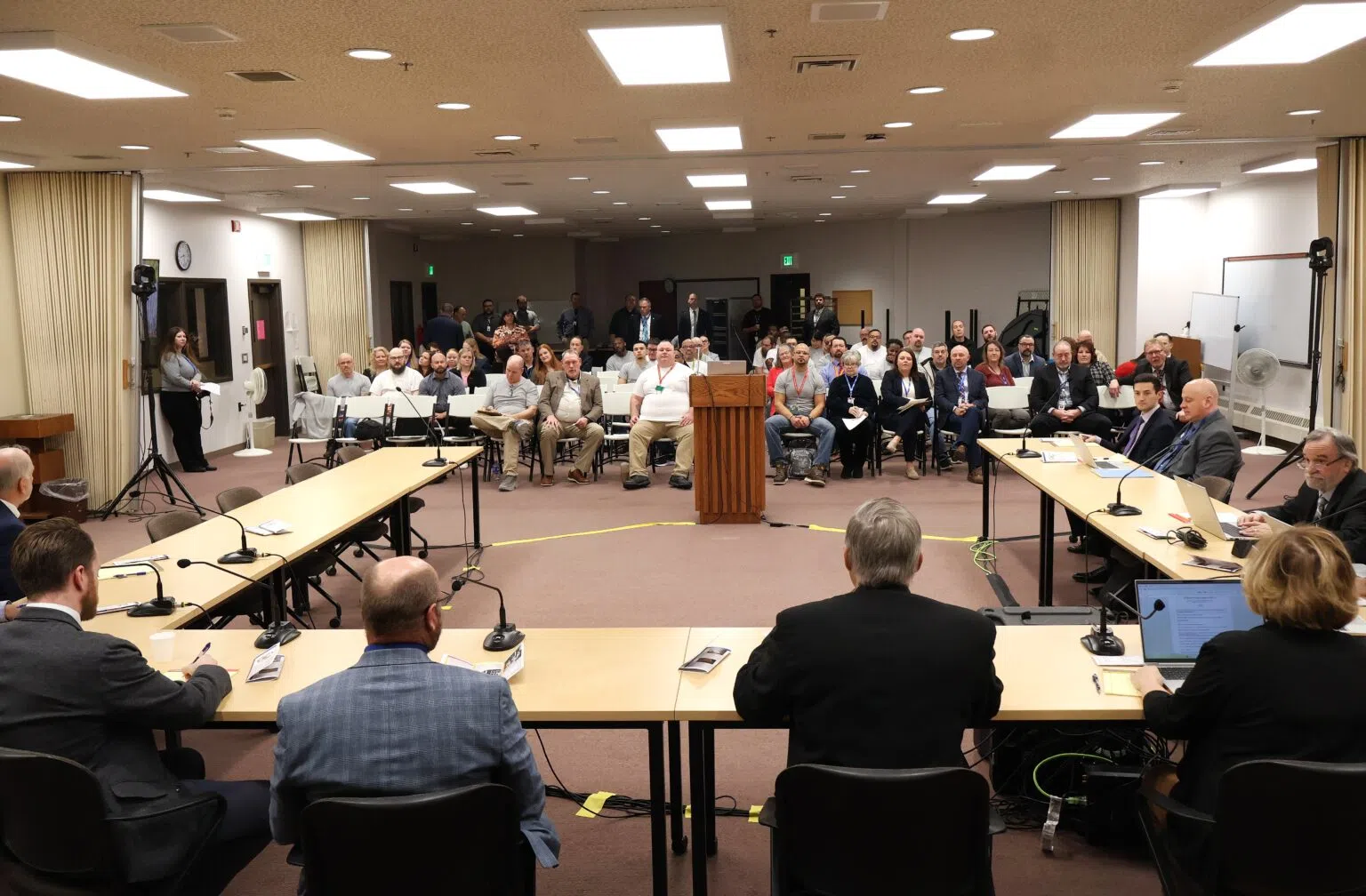
Members of the Senate Appropriations Committee Human Resource Division hold a hearing at the North Dakota State Penitentiary on Feb. 4, 2025. (Michael Achterling/North Dakota Monitor)
By: Michael Achterling
BISMARCK, N.D. (North Dakota Monitor) – There was a podium with a microphone and a sign-in sheet, just like any other legislative committee hearing. A key difference Tuesday was the series of seven locked doors and layers of security that lawmakers had to pass through at the North Dakota State Penitentiary to conduct that hearing.
The hearing on Senate Bill 2015, the budget bill for the Department of Corrections and Rehabilitation, included testimony from inmates and staff members.
In the prison chapel, prisoners and staff praised many of the programs they believe have led them to become better people and better members of society.
Sen. Dick Dever, R-Bismarck, chair of the Senate Appropriations Committee Human Resource Division, said the meeting convinced him that rehabilitation is the most important part in DOCR and caring for inmates doesn’t mean locking them away in a cage.
The insights lawmakers gained during the hearing will help inform their budget decisions. Department leaders and staff emphasized efforts to help people leaving prison become good neighbors.
“To me it’s really more about the people and recognizing that they are here in a safe place, taking advantage of the opportunities,” said Colby Braun, director of the Department of Corrections and Rehabilitation.
Michelle Pfaff, director of education for DOCR, said 32% of people who entered the state prison system in 2024 did not have a diploma or GED. During the last school year, the department’s education program served 567 adults and 78 youth. Eighty-two people will receive diplomas in a graduation ceremony on Friday.
The department also has a series of certifications and other degree plans, ranging from computer skills to equipment operation, and the department is working to establish partnerships with Bismarck State College and Valley City State University, Pfaff said.
Justin Gibson, one of the State Penitentiary inmates who testified to lawmakers, described the impact of the educational program.
“It has helped me to be a more effective communicator with my friends, as well as other people in this prison, as well as a better listener,” Gibson said.
Christian Tolbert, another inmate, told lawmakers about his experience entering prison after staying out of trouble for most of his life. He said it felt like a movie with people beating on the windows as he walked through the facility, but then something unexpected happened.
“The officers down there, they caught me off guard. They were really friendly,” he said. “They made me feel comfortable about being in prison and I never thought I would feel comfortable about being in a prison situation.”
Tolbert later joined the orientation unit to help new inmates adjust. Because he wanted to help inspire people as they enter for the first time, the unit installed a sign in the processing hallway that says, “Welcome, change starts here,” he said.
“These guys have the chance to make their own realities,” he said. “Treatment does an excellent job, but at the same time these guys have to have a self-worth, and that self-worth comes from interacting with people that want better as well.”
Correctional officer Skyler Larsen described the trauma he and others experience, such as performing CPR on an inmate who attempted suicide.
He said he couldn’t sleep after the incident while other nights he has woken up attempting to shield his head from an incoming blow.
He told lawmakers he always wanted to be a police officer and thought working for the DOCR would be a good stepping stone, but he has stayed in corrections for the last six years.
“I believe in what we do here,” Larsen said. “I believe that transforming lives, influencing change and strengthening the community is at the heart of what we do.”
Todd Flanagan, chief of security, said correctional officers participated in a three-month body camera trial in 2024.
“A majority of officers at the end of the trial reported that they were feeling more protected while wearing the cameras and they noticed a reduction of disorderly behavior towards them from certain residents,” Flanagan said.
The department is requesting funding for body cameras in its budget proposal, Flanagan said.
Sen. Tim Mathern, D-Fargo, a member of the Senate Appropriations Committee, said the state still has more work to do because 37% of prisoners released in North Dakota will reenter those facilities in the future.
“Let’s get to the next step,” Mathern said. “We’re doing something that is not quite enough so let’s figure that out and get that done.”
He said the most impressive aspect of the state penitentiary system is having members of community organizations being allowed in to take part in the programs and rehabilitation of inmates.
“That’s what’s making the difference,” he said.




Comments